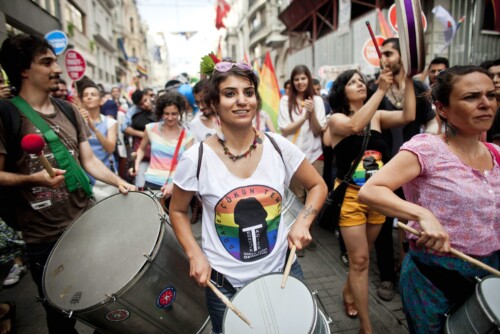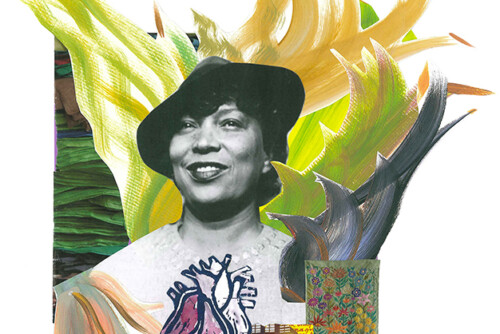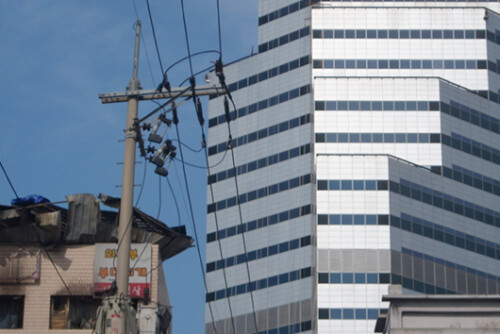Name-to-Name (N2N)
Most of the quotations I have presented so far come out of the film, Name to Name (N2N), a video art project by artist Yera Moreno. Its goal is to present how a wide diversity of people (re)think names, identities and bodies, using personal names as a starting point to open up narrative spaces in which to challenge the fiction of a homogenous, stable, fixed and unitary identity. N2N presents the possibilities and turning points provoked by changing names as a narrative collage. This is an on-going project that continues its research process. The call for interviews is still open.
This video-essay was produced within the Seminar in Critical Practices Somateca at the Reina Sofia National Art Center, directed by Paul B. Preciado. 1 Spanish artists, such as Cabello/Carceller and Mexican writer Sayak Valencia, have collaborated in this video art project, along with activists, drag kings, researchers, etc. In these interviews, we can see multiple “tactical approaches to identity,” in De Certeau’s terms. 2 Every interview deals with the interviewee’s subjective notion of identity and the process of facing resistance while changing their name. Mexican writer Sayak/Margarita Valencia builds on the notion that identity is a process of subjectivity production, which makes her distrust identity labels:
Identity. Being identical to what? Identity does not exist. It would be a process of subjectivity production, machineries of social, political and cultural control… The production of subjectivity inside of these machineries makes me distrust identity labels . . . . . 3
Valencia’s experience around her personal name has a clear impact on how she interprets the relevance of naming and the imposition of certain notions of stability and unity when thinking of identities:
Until I was 3, I was called Sayak, like I call myself now. Here (in Mexico) we have a very serious problem with ethno-racism. Sayak is an Indigenous name. When I was taken to kindergarten, my first year, I was three . . . . The teacher told her [my mother] that I wasn’t Indigenous and that surely I would suffer a lot if I kept this name. So why not change it to something normal? I wasn’t Indigenous so why, then, would I use this name? Why make unhappiness my destiny by naming me something that was somehow making me a minority subject? Instead of promoting my social status, it would lead me to a space in which my mestizaje was more evident. It was taking me to a space that is not respectable in Mexican culture because it is linked to the Indigenous. I don’t have a first name [nombre personal] because it was taken away from me, and I was given another one. By the time I took back my own first name [nombre personal], it was impossible for me to make it may own, it was then something else…” 4
A core part of identity is the unitary perception of the self, which enters into conflict when two people decide to create a joint identity, both as artists and as partners. This is the case of Helena Cabello and Ana Carceller, two well-known queer artists based in Madrid, and known as Cabello/Carceller. Their personal position is in line with the content of their work, which questions naturalized perceptions of gender, sexuality and class.
Cabello/Carceller didn’t arise as a name, but as an answer. . . . at first. Last names are genderless, so we always know when we get selected because of that. The last names are in alphabetical order. Another apparently harmless classification, but one that operates in the subconscious [is the bar]. . . . The “/” sometimes bothers a bit. Many people go against your opinion and add any other sign rather than the one we chose (such as “y”, “+”, “&”…). “/” does not position you, neither does it equate [one to the other] . . . Intervening upon personal names is a clear demonstration of power. . . . Unfortunately, we don’t understand the term identity, not even as artists. 5
Identity is not an accident but rather a process of growing awareness for those people interviewed in N2N—people who decide to change their names to better reflect who they feel they are, often facing resistance in societies that fix identities for a lifetime.
Queer Challenges in Trans*national Activism: Migrantes transgresorxs
The queer group Migrantes Trangresorxs has been developing a specific type of activism since 2009, bringing forth intersectional discussions on race, migration, gender and sexuality. They have been especially visible in Madrid’s Alternative Queer Pride events every June. Most members are from Latin America and are building on their own needs as queer and trans people. They are also posing important legal challenges.
Alex is a member of Migrantes Trangresorxs from Ecuador. Since the 1999 economic crisis in Ecuador, there was an important emigration from that country to Europe, mainly to Spain, via transnational networks and facilitated by governmental and non-governmental actors. 6 Under the auspices of Ecuadorian law, Alex changed his name in the Ecuadorian I.D., introducing a gender-neutral name, while keeping his former female name in his Ecuadorian passport. Upon his return to Spain, after having changed his name, he went to the Ecuadorian Embassy to change his passport to a male name (Alex), while keeping his Spanish I.D. with a female name. He had mixed documents (female Spanish ID, gender-neutral Ecuadorian ID and passport) creating the legal contradiction of having two different gender identities with the same picture, number, and variable data. While transgressive, this choice might well trap him in Spain, since his Ecuadorian passport no longer matches his Spanish I.D. with the female name, and this could be used as evidence that his migrant permit is not his own. This situation will last until he uses his Ecuadorian documents to try to change the Spanish ones. It is also relevant that Alex was about to get his Spanish citizenship, but he did not want to wait or have to prove his gender dysphoria.
I see that my friends first try hormones, or first they use binders… everyone’s processes are so different… I started by changing my name. I took the opportunity during a trip to Ecuador, where changing your name is allowed, regardless of your sexual identity… I said nothing to my family. I regret having chosen two names—Alex Vicky—though. No one knows, but yes, I chose two names because I didn’t want to lose the other one then… Now I regret it, and if I can change it here [in Spain], I am going to change it to just Alex. I don’t know if it is because of my family, or that I really like that name, I can’t tell you now. 7
Having mixed names can be seen as problematic in a binary world. Very different social realms may show similar pressures to conform to one gender or the other. This personal story has become an opportunity for transnational activism. Migrantes Transgresorxs put together a campaign targeting trans immigrants in Spain who cannot, or do not want to, meet Spain’s restrictive legislation regarding trans rights (which, moreover, are only available to Spanish citizens). The campaign was especially directed at trans people from countries such Ecuador, Argentina, and Colombia, where changing names is allowed without a medical procedure or a long period of delay. 8 In Spain, migrants are not allowed to change their names in Spanish legal documents unless the name matches that in their home country’s legal documents. Also, only Spanish citizens may change their name in the Civil Registry in accordance to law 3/2007, unless a person can prove the use of their name for at least five years.
The campaign also warned people not to change their name in their home country’s passport, which could cause Spanish authorities to suspect fraud, impersonation, or possession of a stolen passport. They suggest instead just changing the names in Identity Cards (which in countries such as Ecuador can only be done once in a lifetime). The campaign suggested that, once in Spain, they change their passports at their Embassies, to be able to later change their Spanish documents. Therefore, having several names, which may appear as a problem, could be the only option to run around the Spanish State’s unwieldy regulations and, therefore, to wield agency.
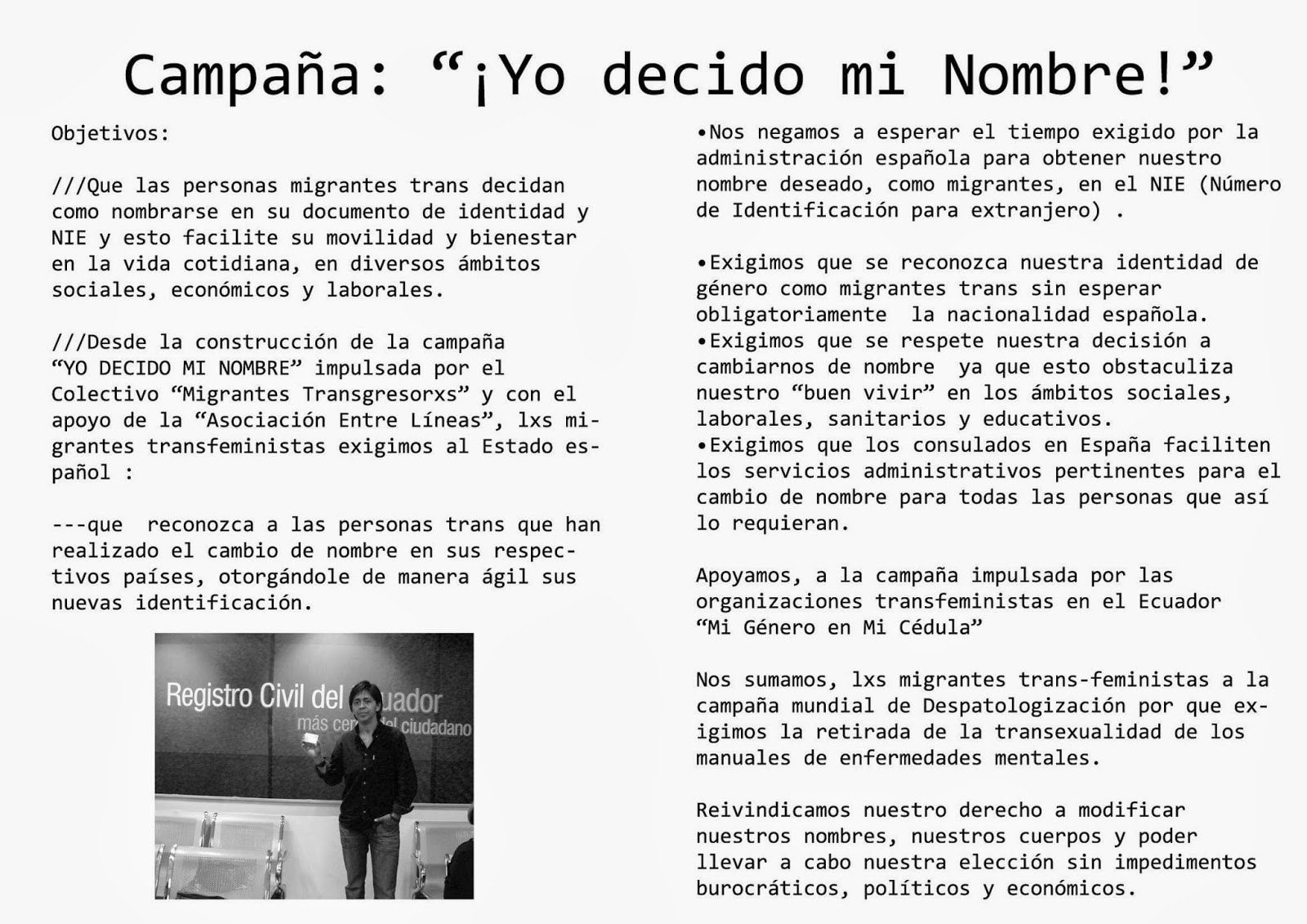
Migrantes Trangresorxs’s creative activist strategy contributed to questioning the uncritical social representation of Spain as a land of sexual freedom, at the same time that it made evident the pinkwashing strategy that is—consciously or unconsciously—a motivating factor in the approval of these laws. Moreover, some Latin American countries are passing less restrictive legislation, which facilitates trans and queer people choosing a path of action regarding their names without undue interference from the State.
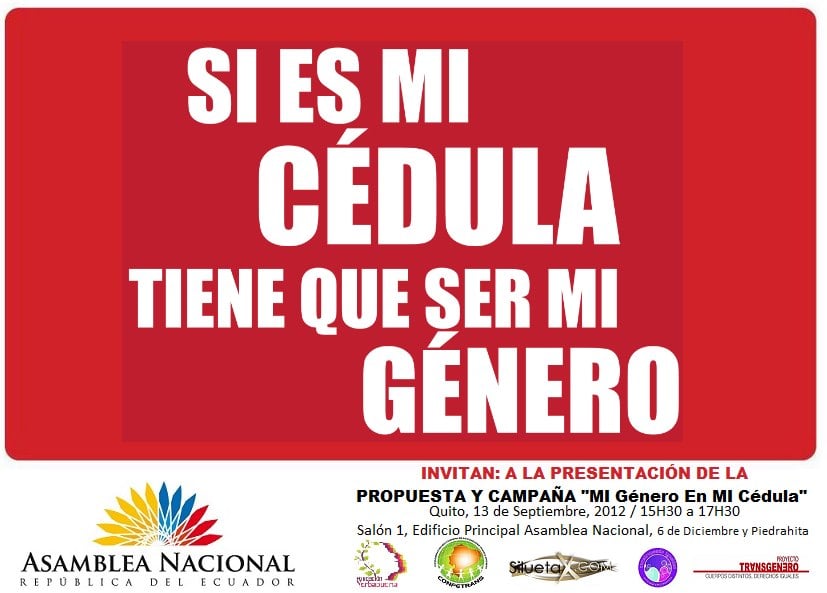
One example is the campaign “Yo decido mi nombre” (“I decide my name”), which connects with Ecuador’s campaign “Si es mi cédula tiene que ser mi género” (“If it is my I.D. it has to be my gender”), launched in 2012 by a number of trans organizations, and also promoted by lawyer and activist Elizabeth Vásquez. 9 The Ecuadorian campaign seeks to change the box for “sex” by “gender” in all IDs, along with facilitating trans people’s modification of their IDs to meet their needs in their daily lives. 10
Migrantes Transgresorxs’ activism contributes to breaking up the linear and uniform narratives surrounding migration and trans identities. The queer diaspora of which this trans migration partakes troubles the notions both of the “ideal home” or “motherland” (country) and of the chosen country as a “land of opportunities.” 11 Often, it is the case that the home to which people may wish to return, or better yet, the promise of a collective wish of belonging, is presented as an unproblematic fact. 12 In order to explore better this sense of queer diaspora and how the migration process is intertwined with how identities are shaped, I interviewed Alex in depth. The subtleties of Alex’s identity proved to be shaped by the experience of being far away from his family’s social control, in a new context where identities make different sense, because of their different geopolitical history. This opened up new opportunities for Alex that were unthinkable to him some years ago:
Traveling opened many doors, since I was far from my emotional bonds, because I think that in Ecuador I wouldn’t have come out… I would have remained as a lesbian, as a feminine lesbian. Because, becoming masculine… I knew that if I did that, I was crossing over to the other side, that I shouldn’t do it, I wanted to be a boy, but that was a no. I had to pretend, dress femme so as not to be called “boy,” I mean, not to be noticed, hiding a bit. We are very family-oriented, and every Sunday I went to visit them, because we loved each other so much, despite the fact that they disliked my identity issue, my sexual orientation at the time… If I ever go back to Ecuador, I would disclose to my family that I am a lesbian, a masculine lesbian, but I don’t think I would go so far, as of now, of saying I am trans. That would be another task altogether, and I am aware that if I needed to return, because of money or work, I would return, but as a masculine lesbian. 13
Back home, Alex’s identity was defined as a “feminine lesbian,” while in Spain he has been able to explore his masculinity. He has realized that he feels closer to being trans, and has taken up activism that responds to his needs, including with Migrantes Transgresorxs. But, Alex is also aware that, if he needs to go back to Ecuador, his gender-expression could only be understandable to his family and friends as a “masculine lesbian.” This reflexivity over his own identity is revealing, since it suggests that identity is not only linked to specific contexts and possibilities, but that changing environments allowed Alex to see himself differently, providing him with new meanings for his past, present and future. As his story demonstrates, time and space are intertwined with sexuality and gender.
Thinking through this queer diaspora implies not only rethinking “home” and the sense of kinship, but also rejecting the narrative of “global queer or global gay,” in which the local vernaculars are irrelevant. The migration process, along with other structural inequalities, is powerfully involved in the negotiation of identity. The discussion that Migrantes Transgresorxs is posing through personal experiences is the following: how do class, race, and gender mediate the experiences of being queer in the diaspora, while re-negotiating so-called natural identities?
Final Thoughts
The current geopolitical context in Spain is relevant for understanding trans*national migration. With repressive legal measures and rising levels of xenophobia, the current situation is not only discouraging immigrants from coming to Spain, but also belying the story of Spain as the vanguard of sexual rights. 14 Queer and trans migrants, along with dissident citizens, want to change their names to meet their needs better while in their various transits. These individuals could be seen as “queer failures,” 15 revealing failure as a positive representation of agency, cut loose from normative conceptions of identity. These individuals are making use of the opportunities available to them to gain more control over their lives, making “queer success” out of normative failures.
Interestingly, queer and trans people in transit, either between Spain and Latin American, between Spain and African countries, or between sexual and gender identity transitions, challenge homonormativity, standard understandings of North-South relationships, and domestic as well as international laws. Spain can no longer sustain its identity as a “motherland to Latin America” (la Madre Patria) or as “Africa’s rich neighbor,” nor can it even hold the “spotlight for sexual and gender rights.” 16 The intersections of racism, classism, and xenophobia are used in Spain against LGBT and queer immigrants from “poor countries,” those who are not seen as desirable, wealthy tourists, and who can easily be confined to Detention Centers. Immigrants are often automatically suspected of abusing resources and breaking the law, and are being used as an argument to reduce sexual citizenship in Spain, as I have discussed with examples throughout this essay. Securing sexual and gender rights in Spain has been promoted under the premise of accepting certain conservative institutions, such as marriage, traditional kinship systems, and clearly demarcated binary gender roles. The critical analysis of policies in regard to names demands conceptual tools, such as queer diaspora, homonormativity, and “bodily citizenship.” This last concept helps us to think of those who may or may not have access to bodily integrity, autonomy, and individual freedom to decide upon their identities and their bodies, against external, or even State, intervention. 17 The relevant discussion here is not about queer citizens doing wrongful things, but rather about the naturalized norms that constitute the foundation of citizenship. One becomes a citizen at the expense of an/other who does not.
While projects like N2N and Migrantes transgresorxs may seem like minority spaces, they can be more productively understood as critical examples in which the personal becomes political. Both projects identify name changing as a broad space for struggle, activism and critique, in which different queer/trans discussions can converge. Not only trans people, but also other disenfranchised subjects can create new opportunities in addressing the need to change names. Therefore, they also open up opportunities for transnational activism. Changing names allows people with different circumstances to help themselves to access lives and understandings of identity that better fit their needs; they are making politics out of their daily life struggles—struggles that citizens of all kinds understand better.
- The participants in the video include, Alex Transfronterizo, E.G, Iñaka, Jorgorio de Canarias, Julia Yagüe Manzano, María Estévez-Serrano, M en conflicto (Mario), m.o, Paca, Sara Fuentes and myself. The Reina Sofia contemporary art museum program on critical practices was the starting point of N2N, see http://www.museoreinasofia.es/actividades/somateca-presentacion-programa-practicas-criticas.[↑]
- Michel de Certeau, La invención de lo cotidiano, Artes de hacer, (México: Universidad Iberoaméricana Instituto Tecnológico y de Estudios Superiores de Occidente, 1990).[↑]
- Sayak/Margarita Valencia in N2N, 2012 “Identidad ¿Ser idéntico a qué? La identidad no existe. Sería un proceso de producción de subjetividad, máquinas de control social, político, cultural… La producción de subjetividad dentro de estas maquinarias me hace desconfiar en las etiquetas identitarias . . . .”[↑]
- Sayak Valencia in Yera Montero, N2N (2012) [↑]
- “Cabello/Carceller no surgió como un nombre, sino como una respuesta… Al principio. Los apellidos no tienen género, por eso siempre sabes cuándo nos han seleccionado por él. El orden de aparición responde al orden alfabético. Otra clasificación aparentemente inocua, pero que opera [en] el subconsciente . . . . La “/” a veces también molesta un poco. Muchos saltan por encima de tu opinión para ponerte cualquier otro signo diferente al que hayas elegido (como “y”, “+”, “&”…) “/” no posiciona, ni iguala…. Intervenir sobre los nombres es una clara demostración de poder. . . . Lamentablemente no entendemos el término identidad, ni siquiera como artistas . . . . ”[↑]
- Brad Jokisch and Jason Pribilsky, “The Panic to Leave: Economic Crisis and The ‘New Emigration’ from Ecuador,” International Migration 40 (2002): 75-102. María Amelia Viteri, “Negociando la vida: Migración ecuatoriana y sexualidades en NYC.” In Resentir lo queer en América Latina: diálogos desde/con el sur, eds. Diego Falconi Trávez, Santiago Castellanos y María Amelia Viteri. Madrid & Barcelona: Egales. 267-285.[↑]
- “Yo veo amigos que primero va la hormonación o primero va el binder, … los procesos son tan distintos de todos… Yo empecé con mi cambio de nombre. Aproveché que me fui a Ecuador, como está permitido el cambiarte de nombre, indistintamente de tu identidad sexual, aproveché y me lo cambié. No dije nada a mi familia, por supuesto. Estoy arrepentido de haberme puesto Alex Vicky, nadie lo sabe, pero sí, me puse mis dos nombres, porque no quería perder el otro. En realidad no lo quería perder en ese momento… Ahora estoy arrepentido, y si acá lo puedo cambiar lo voy a hacer para quedar sólo como Álex, pero no sé. No sé si tiene que ver mucho mi familia o que en realidad me gustaba ese nombre, no te puedo decir ahora.”[↑]
- I refer the reader to my article on the legal requirements in Spain to change one’s gender in the Civil Registry for an extensive discussion of all the hurdles Spanish trans people have to jump through to change their name. See: Raquel Platero (Lucas), “The Narratives of Transgender Rights Mobilization in Spain,” Sexualities, 14 (5; 2011): 597-614.[↑]
- On 6 June, 2012, the following organizations drafted a Law changing the Ecuadorian Civil Registry, proposing to change the category “sex” for “gender” in the ID. See, Confederación Ecuatoriana de Comunidades Trans e Intersex (CONFETRANS); Asociación Silueta X; Proyecto Transgénero; Construyendo Igualdad.[↑]
- According to some activists and journalists, this demand to change from “sex” to “gender” is due to the influence of Judith Butler’s work on identities. See: Ponce, Isabela (2012). El género no se evidencia en la cédula. Diario EL COMERCIO, September 9, 2012, http://conceptovihsida.blogspot.com/2012/09/el-genero-no-se-evidencia-en-la-cedula.html[↑]
- Gayatri Gopinath, Impossible Desires: Queer Diasporas and South Asian Public Culture (Durham: Duke University Press, 2005).[↑]
- Anne-Marie Fortier, “‘Coming home’: Queer Migrations and Multiple Evocations of Home,” European Journal of Cultural Studies 4, no. 4 (2001): 405-424.[↑]
- “Viajar me abrió un montón de puertas, al estar lejos de mis lazos afectivos, porque yo creo que en Ecuador no hubiera salido de… hubiera seguido siendo lesbiana, y una lesbiana femenina. Porque, claro, el hecho de hacerme masculina… Yo sabía que si hacía eso, estaba pasándome como al otro bando, y que no lo debía hacer, quería ser chico, y que no. Entonces tenía que disimular, vestirme de femme para que no me digan ‘chico,’ o sea que no se den cuenta, esconderme un poco.… Somos muy familiares y yo cada domingo me iba a verles, que nos queríamos mucho a pesar de que molestaba mi cuestión de identidad, de mi orientación sexual en ese tiempo… Si vuelvo a Ecuador, hablaría con mi familia de que soy lesbiana, que soy una lesbiana masculina, pero no creo que llegaría al punto, por ahora, de decirles que soy trans. Entonces sería como otro trabajo, y estoy consciente de que si por la cuestión económica ahora, por el trabajo tengo que volver, yo regresaría, pero como lesbiana masculina.”[↑]
- Osborne, Raquel Valentina Longo, Silvina Monteros, Vicky Alex Aguirre, Leticia Rojas and Silvia La situación social de la población migrante TLGB en España, desde un enfoque de género y de derechos humanos, (Santo Domingo, Republica Dominicana: ONU Mujeres, 2011).[↑]
- Judith Jack Halberstam, In a Queer Time and Place: Transgender Bodies, Subcultural Lives, (New York: New York University Press, 2005).[↑]
- It is important to take into account the different colonial relationships between Spain and Latin America and between Spain and Africa.[↑]
- Joyce Outshoorn et. al., “Remaking Bodily Citizenship in Multicultural Europe: The Struggle for Autonomy and Self-determination,” in Remaking Citizenship in Multicultural Europe, Beatrice Halsaa, et. al., (Basingstoke: Palgrave Macmillan, 2012), 118-142.[↑]
